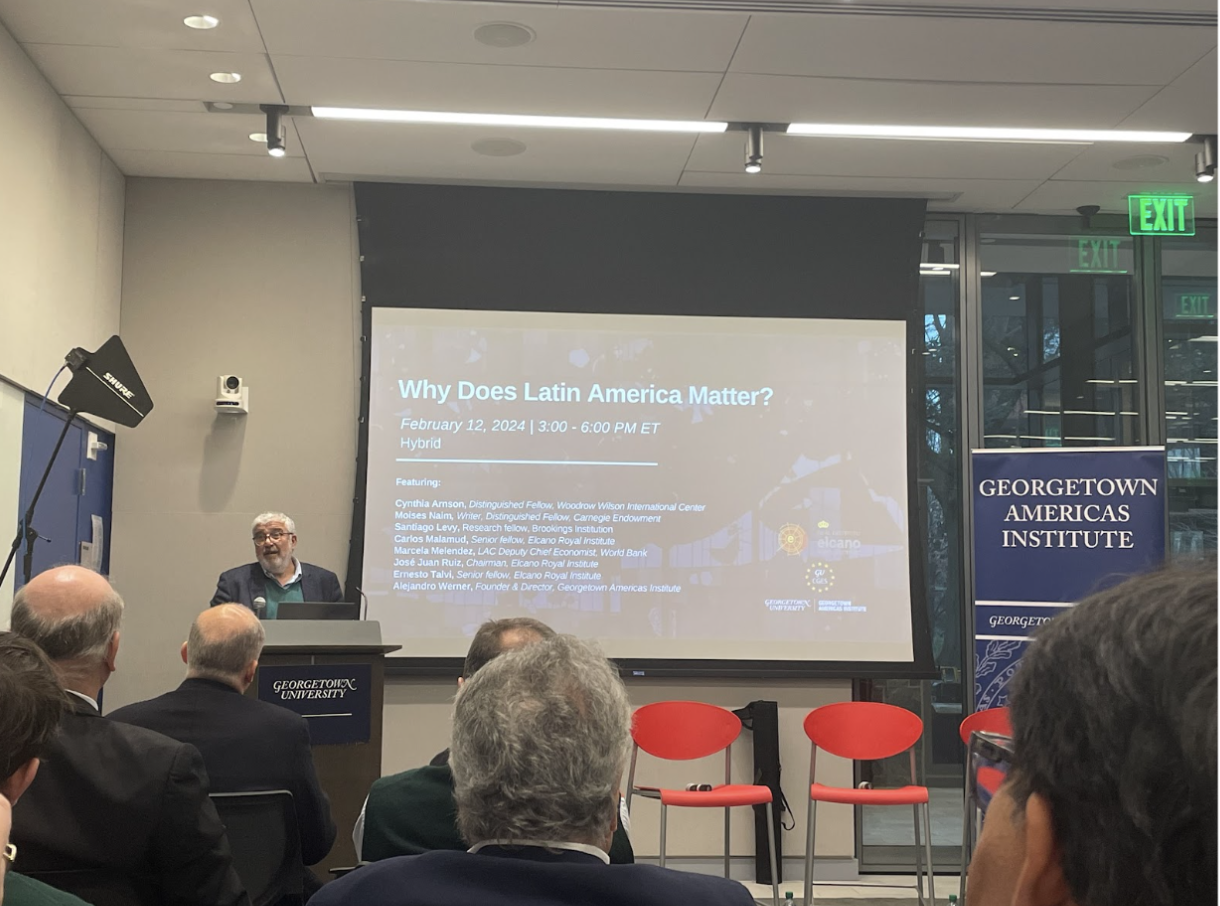Tropical Crossfire: Leading Economists Debate Latin America’s Future
Photo via Luis Brea
LUIS BREA: WASHINGTON, D.C.— “Why are we investing in this disaster zone?” asked economist Ernesto Talvi, reiterating many European sentiments towards Latin America. Talvi’s life’s work— alongside those of his fellow panelists— has been to debunk this question’s premise.
On Monday, the Georgetown Americas Institute gathered a panel of economists in the Arrupe Multipurpose Room to explore Latin America’s recent successes and struggles. Panelists showed consensus on Latin America’s potential— but were not shy to point out the region’s shortcomings.
The event was anchored around a recent Elcano Royal Institute report on Latin America’s economic and political state. José Juan Ruiz, the Spanish think tank’s chairman, responded to European critics who claim Latin America is a lost cause: “Data kills the narrative.”
Talvi explained that this false portrayal is often tied to convergence, or the assumption that poorer economies naturally improve faster than their developed counterparts. Talvi condemned this outdated metric: “Judging [Latin America’s] performance to an unattainable objective is not only unfair— it is wrong.”
Other panelists highlighted major roadblocks and failures in Latin America’s development.
Marcela Melendez, an economist for the World Bank, noted the region’s stagnation, caused by “messy regulatory frameworks.” Co-opting economic language, Melendez also lamented that Latin American countries have “become excellent exporters of organized crime.” Specifically, Melendez noted that Latin America’s homicide rate supersedes the rest of the world four times over.
Georgetown Professor Carlos Malamud explained this recent crime crisis by citing America’s Condor Operation, in which American intelligence agencies propped up South American dictatorships in the late 1900s. Upon hearing the audience’s nervous laughter, Malamud responded, “What? It’s true! Let's be honest.”
Economist Santiago Levy shifted the conversation to the region’s domestic policy shortfalls, admitting that Latin American states have “made a mess of social welfare.” This “hodgepodge of social redistribution,” Levy explained, has been unsustainable and unfriendly to economic growth. Despite his less-than-rosy assessment of Latin America, he noted that the Elcano report was “refreshing” in its optimism.
The event’s back-and-forth nature sparked new questions for students of both political and economic disciplines.
Travis Hargett, a Master’s Student at the Walsh School of Foreign Service, shared that the panel offered interesting context to his business background in Latin America. Hargett added that the panelists’ emphasis on “the need for a welfare state” particularly stood out to him.
On the political front, Kristian Thymianos, a Georgetown University Master’s in Public Policy student, shared similar Latin American policy concerns with the panelists. With these challenges in mind, Thymianos stated, it is “important to bring these conversations to people in power.”
As for Latin American event organizers on campus, the work is never done. Facundo Robles, the President of Latin America and The Caribbean Policy Association, underscored the region’s vastness: “If you would want to [sit down and] talk about, let's say, democracy in the region— you would literally need a week.”
The panelists illustrated this limitation best, leaving audience members with more open-ended questions than definite answers about the region’s future. Nevertheless, Juan Ruiz insists his report should be seen “not as a final destination but as a stepping stone in a very deep, aggressive and ambitious integration between the European Union and the whole of Latin America.”
Luis Brea is a Freshman at Georgetown University majoring in Government and Spanish. He is a Staff Writer for On the Record and writes the weekly blog for the Philodemic Debate Society.

